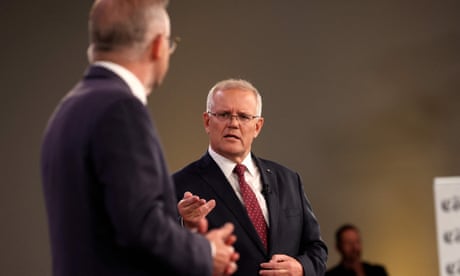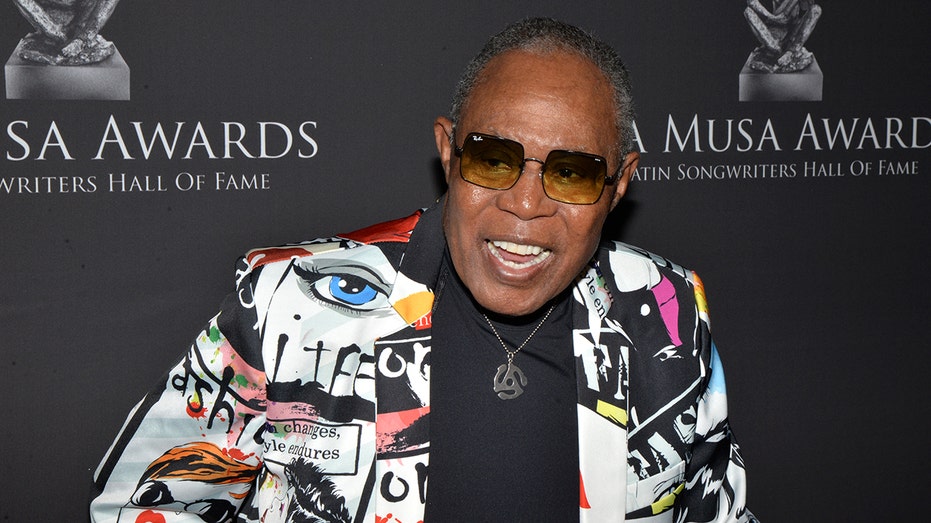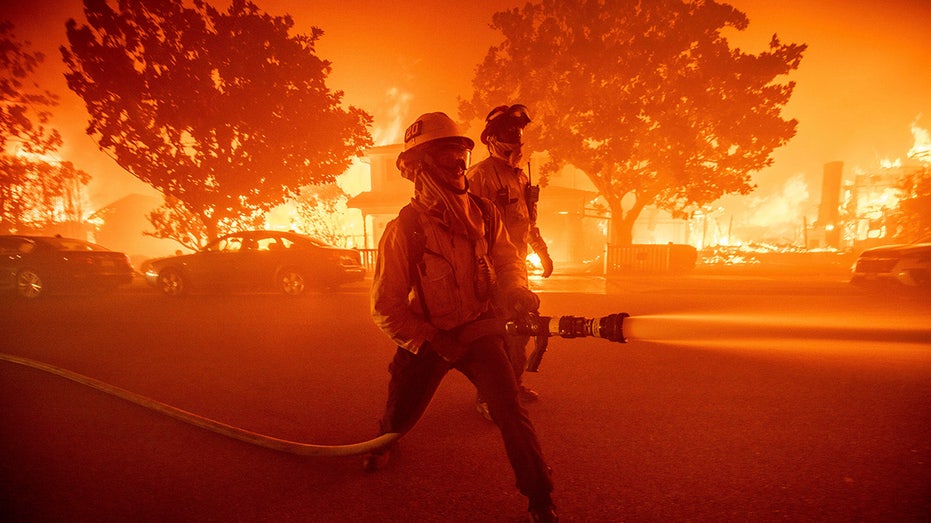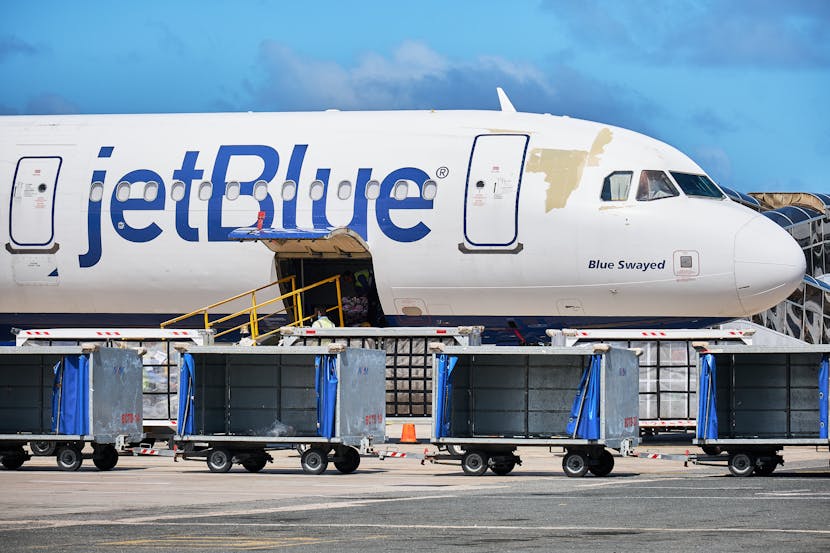- by foxnews
- 12 Jan 2025
Morrison and Albanese clash on Solomon Islands-China pact in first leaders’ debate of federal election
Morrison and Albanese clash on Solomon Islands-China pact in first leaders’ debate of federal election
- by theguardian
- 21 Apr 2022
- in news

Australia's political leaders have traded barbs over China's security agreement with Solomon Islands, with Anthony Albanese labelling it a "Pacific stuff-up" and Scott Morrison accusing him of siding with China.
In an evenly matched outing in the first leaders' debate on Wednesday, the prime minister focused on handling of the economy while Albanese accused the government of "treading water" and "not pursuing any significant economic, social or environmental reforms".
The debate marks a turning point in the six-week campaign, as Labor prepares to launch its negative ads against Morrison, which will focus on the prime minister's refusal to take responsibility and feature footage of him saying "that's not my job".
On Wednesday evening Albanese argued that the Morrison government "haven't learned from their mistakes, they keep repeating them" and promised that, if elected, he will "accept responsibility" and "not always seek to blame someone else".
Facing the Sky News town hall of undecided voters, Morrison credited Labor for "great" reforms like the national disability insurance scheme but claimed the Coalition is needed to pay for them.
At one point Morrison suggested to a woman, Catherine, whose autistic son, Ethan's, NDIS package had been cut that he had been "blessed" with two children who "haven't had to go through that". Morrison added the explanation that was why he "can only try and understand your aspirations for those children".
The answer drew a sharp social media rebuke from the former opposition leader and NDIS architect Bill Shorten:
Albanese said the example of the 30% cut to Ethan's care package was "not isolated" and described the NDIS as a "proud Labor reform", arguing that it is "always Labor" that makes "changes that make a difference to people's lives".
Labor enters the final month of the federal election campaign with an edge in the opinion polls but the Coalition is buoyed by Morrison's campaigning skills and an early stumble by Albanese over economic figures.
Both leaders put the difficulties of the first week behind them, with no gotchas on economic figures or questions over divisions in the Liberal party over the controversial Warringah candidate, Katherine Deves.
The most heated exchange of the evening came when discussing China's security deal with Solomon Islands. Morrison rejected Labor's charge that this was "a policy failure", claiming "no, this is happening because China is seeking to interfere in the Pacific".
"What I don't understand is that when something of this significance takes place, why would you take China's side?"
Albanese said national security should not be the subject of an "outrageous slur" like that. Despite China's more forceful posture, Australia is "not really stepping up", he said.
"This isn't so much a Pacific step-up. It's a Pacific stuff-up. This is a major foreign policy failure by Australia."
Albanese was voted the winner of the debate, with the Labor leader convincing 40% of the 100 undecided voters at the event. The prime minister received 35%, while 25% of attendees remained undecided.
Earlier, Morrison moved to defuse an emerging Labor campaign that the Coalition's bid to revisit its industrial relations reforms would neuter the better off overall test and result in pay cuts, committing that this element of the bill was "not part of our forward agenda".
"We said we would only go forward with the measures that weren't emergency pandemic measures," he said, cleaning up days of doubt over whether a commitment to bring the bill back would include its most contentious element.
Both leaders refused to resile from scare campaigns suggesting the Coalition may force aged pensioners onto the cashless debit card and that Labor's asylum seeker policies may restart boats.
Morrison sought to wrong-foot Albanese over asylum seeker policy, querying why as deputy prime minister in 2013 Albanese had supported offshore detention but not boat turn-backs.
Albanese countered that Morrison was "always looking for division" and Labor supported the turn-back policy now.
Morrison sought to undercut the viability of Labor's proposed reforms in the aged care sector, arguing the government "can't make nurses fall out of the sky" to meet a standard of nurses present 24/7.
He said that setting that standard, even with the best of intentions, would result in aged care facilities in rural and regional areas closing.
Albanese had a few free hits at the Coalition's record on integrity issues, including the mystery sources of Christian Porter's legal fees, the $27bn overspend on the Leppington triangle land purchase, sports rorts and commuter car parks - the latter three of which he labelled an "abuse of taxpayers' money".
"We need a national anti-corruption commission with teeth," he said.
Morrison defended the government's proposed integrity commission model, despite earlier in the campaign abandoning any commitment to legislate it in the next parliament unless Labor supports it.
Faced with a voter question about restoring trust in the democratic process, Morrison delivered a stump speech about the economy.
Morrison concluded the debate by framing the election "as a choice" that would determine Australians' "economic opportunity, jobs, wages and the services that Australia can afford to deliver".
- by travelandtourworld
- descember 09, 2016
Delta, American Airlines, Southwest, PSA, SkyWest, Frontier, Rossiya, Avianca See Cancellation Today: Here is What You Need To Know Before Your Travel Planning ?
Airline performance in the U.S. has recently come under scrutiny as major carriers and regional operators face widespread cancellations and delays, leaving passengers frustrated and travel plans disrupted. Delta Airlines recorded the highest number of cancellations, with 357 flights canceled (12%) and 561 delays (20%), while American Airlines followed with 176 cancellations (5%) and 456 delays (15%).
read more


